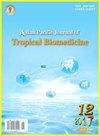Glinus lotoides ethanolic extract alleviates LPS-induced anxiety and depression-like behavior by modulating antioxidant and inflammatory biomarkers in rats
IF 1.7
4区 医学
Q3 TROPICAL MEDICINE
引用次数: 0
Abstract
Objective: To explore the protective role of Glinus lotoides ethanolic extract in a depression model through modulating oxidant/antioxidant enzyme system and inflammatory status. Methods: Phytochemical constituents of Glinus lotoides ethanolic extract were evaluated qualitatively and quantitatively along with HPLC. Rats were divided into six groups. The normal control and the intoxicated groups received normal saline, and the standard group received imipramine, while the remaining groups received 100, 300, and 500 mg/kg Glinus lotoides ethanolic extract. All groups received treatments for 14 d. Lipopolysaccharides (LPS) were then administered i.p. (0.83 mg/kg) to all groups except the normal control group. After 24 h, anxiety and depression-like behaviors were evaluated by performing behavioral analysis (open field, tail suspension, forced swim, sucrose preference test), and determining total oxidant status, total antioxidant capacity, catalase, and biochemical parameters [malondialdehyde, glutathione, superoxide dismutase, tumor necrosis factor (TNF)-alpha and interleukin (IL)-6]. Results: Phytochemical studies confirmed the presence of phenols and flavonoids and HPLC analysis showed the presence of gallic acid, quercetin, chlorogenic, and caffeic acid. Total oxidant status was significantly decreased, while total antioxidant capacity was significantly increased in the Glinus lotoides ethanolic extract treated groups. Moreover, Glinus lotoides ethanolic extract diminished malondialdehyde, IL-6, and TNF-alpha levels, while increasing superoxide dismutase, catalase, and glutathione activities. Conclusions: Glinus lotoides ethanolic crude extract shows significant antidepressant activity by modulating oxidative and biochemical parameters that supports its folkloric use in traditional systems of medicine.白羊草乙醇提取物通过调节抗氧化和炎症生物标志物减轻lps诱导的大鼠焦虑和抑郁样行为
目的:探讨荷李乙醇提取物通过调节氧化/抗氧化酶系统和炎症状态对抑郁症模型的保护作用。方法:采用高效液相色谱法对莲花乙醇提取物的植物化学成分进行定性和定量评价。将大鼠分为六组。正常对照组和醉酒组接受生理盐水,标准组接受丙咪嗪,而其余组接受100mg/kg、300mg/kg和500mg/kg的莲花乙醇提取物。所有组均接受14天的治疗。然后对除正常对照组外的所有组腹膜内给予脂多糖(LPS)(0.83mg/kg)。24小时后,通过行为分析(开阔场地、尾部悬吊、强迫游泳、蔗糖偏好试验),并测定总氧化剂状态、总抗氧化能力、过氧化氢酶和生化参数[丙二醛、谷胱甘肽、超氧化物歧化酶、肿瘤坏死因子(TNF)-α和白细胞介素(IL)-6],评估焦虑和抑郁样行为。结果:植物化学研究证实了酚类和黄酮类化合物的存在,HPLC分析显示存在没食子酸、槲皮素、绿原酸和咖啡酸。总氧化剂状态显著降低,而总抗氧化能力显著提高。此外,荷李乙醇提取物降低了丙二醛、IL-6和TNF-α水平,同时增加了超氧化物歧化酶、过氧化氢酶和谷胱甘肽活性。结论:莲子乙醇粗提取物通过调节氧化和生化参数显示出显著的抗抑郁活性,这支持了其在传统药物系统中的民间应用。
本文章由计算机程序翻译,如有差异,请以英文原文为准。
求助全文
约1分钟内获得全文
求助全文
来源期刊

Asian Pacific journal of tropical biomedicine
Biochemistry, Genetics and Molecular Biology-Biochemistry, Genetics and Molecular Biology (miscellaneous)
CiteScore
3.10
自引率
11.80%
发文量
2056
审稿时长
4 weeks
期刊介绍:
The journal will cover technical and clinical studies related to health, ethical and social issues in field of biology, bacteriology, biochemistry, biotechnology, cell biology, environmental biology, microbiology, medical microbiology, pharmacology, physiology, pathology, immunology, virology, toxicology, epidemiology, vaccinology, hematology, histopathology, cytology, genetics and tropical agriculture. Articles with clinical interest and implications will be given preference.
 求助内容:
求助内容: 应助结果提醒方式:
应助结果提醒方式:


